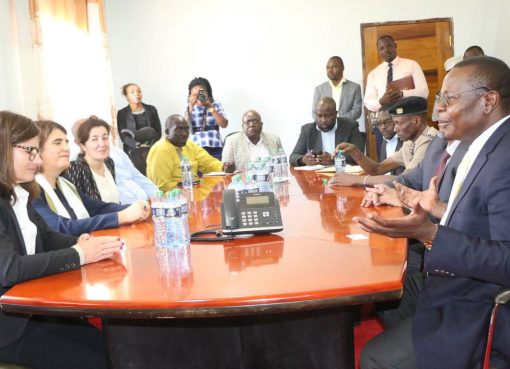Kenya Power held its 2nd E-mobility Conference and Expo with stakeholders in efforts to embrace innovation, transform E-mobility, and drive growth in the transport sector.
Energy and Petroleum Cabinet Secretary (CS), Davis Chirchir, said the Ministry of Energy and Petroleum is actively involved in the governance of the National E-Mobility Policy, which is spearheaded by a multi-agency Task Force whose objective is to provide an enabling environment for the growth and adoption of electric vehicles in the country.
The CS made the remarks in a speech read on his behalf by the State Department for Energy Principal Secretary, Alex Wachira, on Tuesday during the 2nd Kenya Power E-Mobility and Expo Conference themed ‘Accelerating the Adoption of E-Mobility in Kenya, held at Kenyatta International Convention Centre in Nairobi.
Chirchir said the world is facing unprecedented changes caused by climate change and environmental degradation, adding that it is upon citizens to embrace innovative and transformative solutions that will not only mitigate the challenges but also create a more resilient and sustainable future for the coming generation.
He noted that the transport sector in the country is the second-highest contributor to greenhouse gas emissions, which account for approximately 30 percent of the total emissions.
Chirchir emphasised that this is one of the priority intervention areas nationally, which determines contribution premises, commitment and national climate change action plan.
“In the year 2022, the country’s total petroleum import cost was about Sh630 billion (4 billion dollars), which was over 90 percent increase from the year 2021. These impacts negatively on our foreign exchange service,” CS said.
Chirchir reiterated that the country has abundant domestic electricity retention, especially from the renewable energy space, which powers the transportation sector and is neatly positioned to lead the change towards e-mobility.
The CS acknowledged the country’s investment in green energy infrastructure, including geothermal, wind and solar power, which has laid a solid foundation for the widespread adoption of electric vehicles (EVs).
“By leveraging our renewable energy potential, we can not only recognise our transportation sector but also reduce our reliance on imported fossil fuels and enhance energy security,” he stated.
The CS said the national electricity demand curve of a typical day shows a huge disparity between peak and off-peak power requirements, adding that to maintain system sustainability, power generation is normally reduced during off-peak hours.
He revealed that according to the EPRA data, a total of 495,407 mega hours were attained between July 2022 and June 2023, which is a lot of energy that could be put to use by creating demand at night, as well as by charging electric vehicles, especially at night.
The CS announced that in the year 2020, the Ministry launched the Kenya National Energy Efficiency and Conservation Strategy, which identified transport as a key sector to improve energy efficiency and set out a target of five percent of the annual importation of vehicles to be electric and to increase adoption of e-mobility.
Chirchir noted that the policy will be integrated and comprehensively provide a legal and regulatory framework to promote adoption of e-mobility, while seeking and coordinating the efforts of various ministries, departments, and agencies (MDAs) in the national county government and other partners in direct mobility in space to ensure cohesion and coherence in the growth of the sectors and avoid the wastage of public resources.
He argued that successful transition to e-mobility requires a holistic and integrated approach which necessitates collaboration between government agencies, private sector players, development partners and civil society organisations.
CS added that the partnership will address the challenges related to infrastructure development, technology deployment, policy formulation and public awareness to create and foster a robust environment for electric mobility and ensure that charging infrastructure and electric vehicles are accessible to all segments of society.
The Chairman, Kenya Power Board of Directors, Joy Masinde, said that the Institute of Energy Studies and Research (IESR) stands to serve as the premier training and research centre for e-mobility, as she also welcomes investors and stakeholders who are interested in advancing research and development in the field.
“As we embrace the diversification of our interests, mobility emerges as one of the most promising and exhilarating opportunities to propel our business forward. We remain steadfast in our commitment to adapting to evolving market dynamics and embracing innovation to ensure our transformation into a sustainable company,” she said.
Masinde announced that Kenya Power is continuing to push transition to over 2,000-strong fleet to electric, as she urges all stakeholders to work hand in hand towards unlocking the full potential of e-mobility.
By Sharon Atieno





